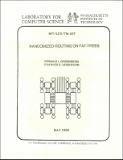Randomized Routing on Fat-trees
Author(s)
Greenberg, Ronald I.; Leiserson, Charles E.
DownloadMIT-LCS-TM-307.pdf (6.504Mb)
Metadata
Show full item recordAbstract
Fat-trees are a class of routing networks for hardware-efficient paralle computation. This paper presents a randomized algorithm for routing messages on a fat-tree. The quality of the algorithm is measured in terms of the load factor of a set of messages to be routed, which is a lower bound on the time required to deliver the messages. We show that if a set of messages has load factor lambda on a fat-tree with n processors, the number of delivery cyles (routing attempts) that the algorithm requires is O(lambda + lg n lg lg n) with probability 1-O(1/n). The best previous bound was )(lambda lg n) for the off-line problem where switch settings can be determined in advance. In a VLSI-like model where hardware cost is equated with physical volume, the routing algorithm demonstrates that fat-trees are universal routing networks in the sense that any routing network can be efficiently simulated by a fat-tree of comparable hardward cost.
Date issued
1986-05Series/Report no.
MIT-LCS-TM-307